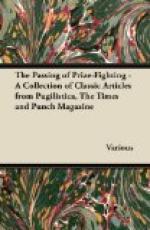Three things charmed me particularly about Henry Elizabeth (HURST AND BLACKETT), whose remarkable second name was due to the fact that he was born in the same year as the Virgin Queen and that his father had hoped that he too would be a girl. In the first place he became the greatest swordsman of his age and I was thus able to add him to my fine collection of Elizabethan heroes who have achieved this honour. What happens when two of these champions meet in those shadowy regions of romance where all costume novels are merged I do not know. It must be rather like the irresistible force and the immovable object. In the second place H.E. (no one could better deserve these formidable initials) was given the job of clearing Lundy Island of its piratical tenants, and I happened to have Lundy Island just opposite me as I read the book. It is not often that a reviewer has the chance of checking local colour with so little pains. And in the third place Mr. JUSTIN HUNTLY MCCARTHY informs me, on page 101, that his hero will “gaze one day upon rivers to which the Thames should seem little better than a pitiful rivulet.” As Henry never gets further from his native Devon than London in the course of this novel I take it that this is a delicate allusion to the possibility of a sequel. I hope it is so, and that I shall hear of Henry in days to come, after a trip or two with RALEIGH or DRAKE, rebuilding his manor of Braginton, which was unfortunately burnt to the ground, and settling down to plant potatoes and tobacco in prosperity and peace.
* * * * *
From the title, Brute Gods (HEINEMANN), you may guess that Mr. LOUIS WILKINSON’S new novel does not deal with homely topics in a vein of harmless frolic. In recommending this very serious work of an expert author and observer, I am bound to make some reservation. Unsophisticated youth, if such there be in these days, should be kept away from the affair between Alec Glaive and Gillian Collett. Alec, a mere boy, was in a dangerously unsettled condition when the lady crossed his path. His mother had upset a not too happy family by eloping with a literary poseur; the egoism of his father had been rendered even more oppressive and his sarcasm even more acid thereby; and a Roman Catholic priest, intent on securing a convert for his Order, had been plying his young mind with too exciting conversations and too refreshing wines. Apart from external circumstances, Alec was tending to quarrel with humanity at large, and so he went the whole hog, more in search of a desperate ideal than by way of impetuous sin. Mr. WILKINSON treats the affair with deliberate, cold-blooded, even cynical analysis; and his portrayal of the snobbery and humbug of the upper-middle class, social and intellectual, in which his creatures move is searching and disturbing. But, I ask myself, are people really like that?




